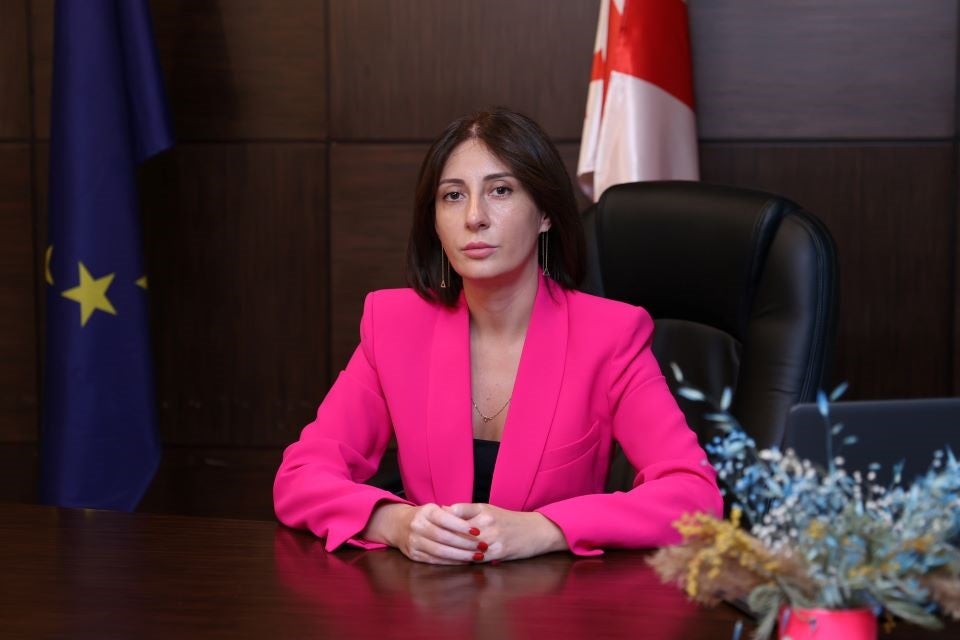Take five: “Staff of the Office of Resource Officers have identified numerous cases of domestic violence”
Date:

Sofio Abulashvili is the Head of the LEPL Office of Resource Officers of Educational Institutions, the agency aimed at supporting the creation of a safe, non-violent and equitable environment in schools. Since 2021, with the support of UN Women and with EU funding, the staff of educational institutions have been attending training courses on gender and domestic violence, which helps them to not only ensure a stereotype-free space in school life but also engage in the timely prevention of and effective response to the cases of violence. In 2022–2023, a total of 2,224 principals, teachers and resource officers completed the training, resulting in an increase in the number of cases of violence reported from educational institutions to the State Care Agency, from 116 reports in 2021 to 469 in 2022. Sofio Abulashvili was an active participant in this process.
How does the Office of Resource Officers work in schools in terms of overcoming gender stereotypes and increasing the number of reported cases of violence?
The Office is now working in three important areas: the first is a safety component, within which resource officers are taking care of student safety; the second is our Psychosocial Service Centre, which provides free psychosocial counselling to students and other individuals involved in school life, including through the hotline 08 00 00 00 88 and the online portal befriend.mes.gov; and the third domain - the Inclusive and Special Education Support Centre - was added this year.
Our employees pay special attention to each case related to various forms of violence between children or against them, actively participating in the detection of and response to such incidents. The Office lays special emphasis on prevention, which also includes awareness-raising campaigns. Our resource officers, psychologists and social workers hold thousands of awareness and educational meetings on various topics throughout the year with students, parents, teachers and administration representatives. These include violence and cyberbullying, domestic violence and child marriage, gender equality, tolerance, and anti-discrimination approaches, among other topics. Tens of thousands of students, school representatives and parents participate in these activities annually.
What measures are being taken to improve the competence of resource officers on the issues of gender stereotypes and violence?
Resource officers are present in 720 public schools across Georgia, where more than 90 per cent of the country’s students study in total. We are committed to upgrading the qualifications of our employees and to their continuous education as well. In this regard, we closely cooperate with partner international organizations, including UN Women.
Within the framework of the EU-funded project “Ending Violence against Women and Girls in Georgia”, and with the support of UN Women, the resource officers, social workers, and heads and coordinators of the Planning and Analysis Division of Tbilisi and regional centres have attended important trainings on gender and domestic violence since 2021. The course, which is currently being updated, under the programme EU 4 Gender Equality: Together Against Gender Stereotypes and Gender-Based Violence – Phase 2 is based on the training programme specially designed for the Office of Resource Officers of Educational Institutions.
In addition, with UN Women support, we have conducted training-of-trainers for our employees, who constantly deliver training sessions for their colleagues, students and other individuals involved in school life. They have already trained 900 active resource officers, and this process is still going on.
Continuous education is extremely important, so that employees can properly apply the acquired knowledge in their daily activities and contribute to raising students’ awareness on early marriage, gender equality and other relevant issues.
How would you evaluate the effect of these measures?
As a result of the activities carried out by the Office of Resource Officers, the environment has become more supportive for students, and there is an enhanced cooperation among the school personnel. In recent years, the staff of the Office of Resource Officers have identified numerous cases of domestic violence and responded to them accordingly. The same can be said about the risk of early marriage or the cases of violence against children outside the school space.
In your opinion, how did the training of resource officers affect the increased rates of reporting cases of violence?
I think that the more informed a potential victim or authorized persons are in these issues, the more likely it is that no occurrence of any form of violence will be left unaddressed in terms of prevention or response.
These activities have not only increased the detection rate but also led to an increased referral rate from teachers, students themselves and their parents too. For us, this increase serves as a positive signal - and as evidence of raised awareness.
How will you continue working in terms of overcoming gender stereotypes in the school environment and increasing the number of reports of violence cases?
We will keep on paying much attention to the implementation of preventive measures and the continuous education of our staff, and we will definitely go on with awareness-raising campaigns to promote equality, tolerance and mutual respect in future generations. Along with education, these are the values that serve as prerequisites for them to develop into decent citizens of a country with European values.